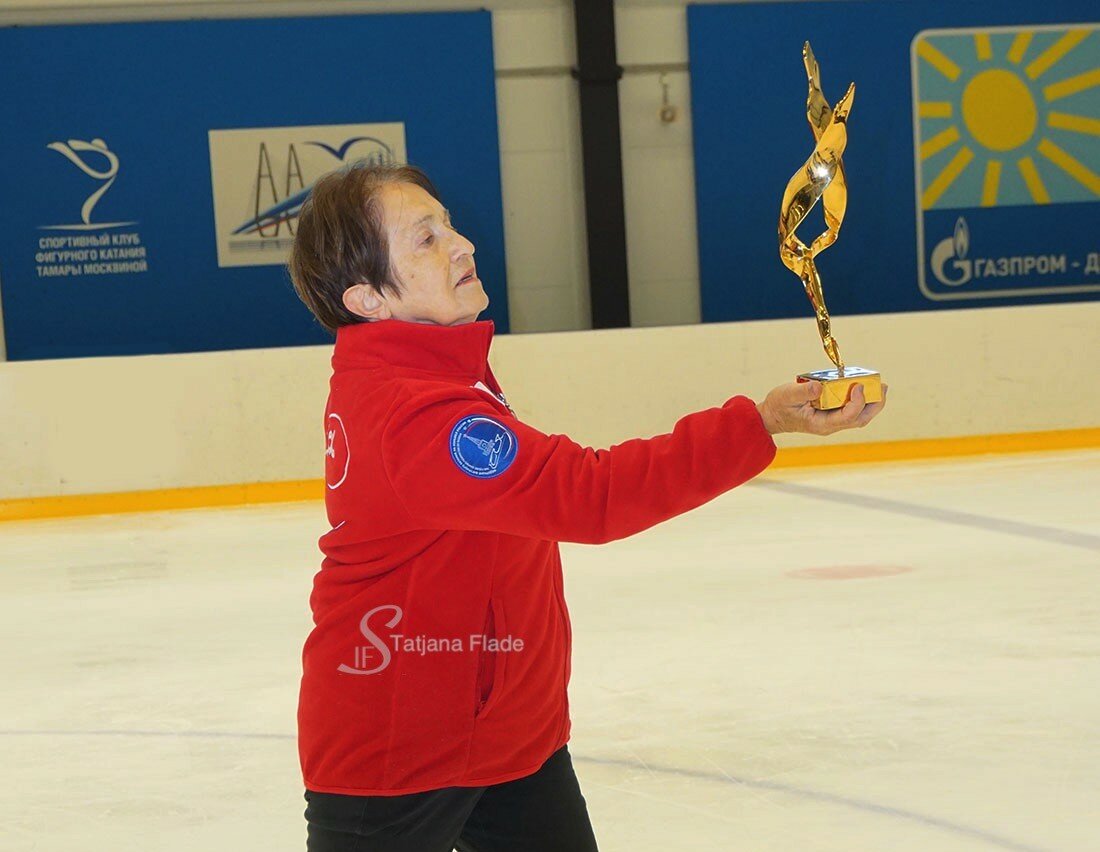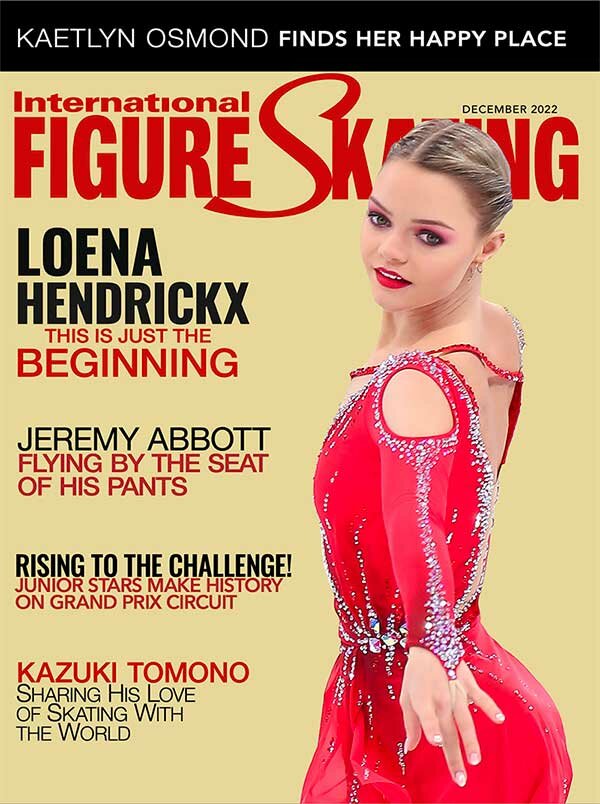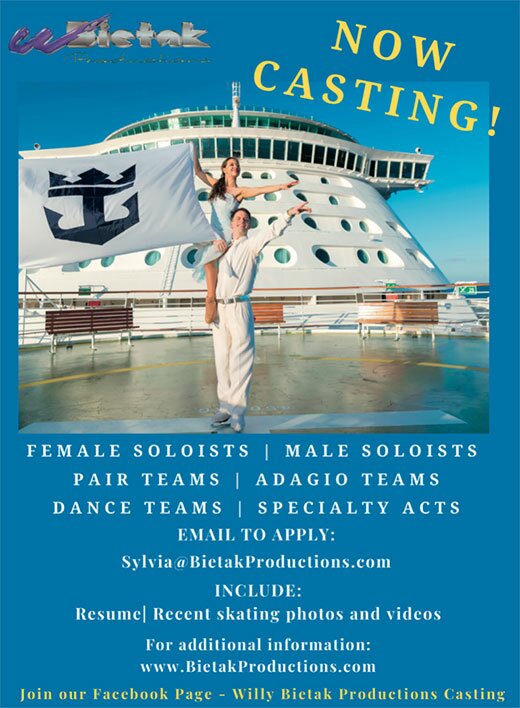

Tamara Moskvina celebrated her 80th birthday on June 26, but age has never factored into how she lives her life. Though she still dons her skates almost every day to work with her students, this will be the final Olympic quad for the renowned coach.
When Tamara Moskvina’s father brought a pair of second-hand skates for his then 10-year-old daughter, little did he, or anyone else know that this gift would steer the course of her life for the next 70 years.
Born in Leningrad (St. Petersburg) in 1941 as Tamara Bratus, she first learned to skate on an ice surface that sat on top of a tennis court. Years later, she moved to train at a rink that was housed in an abandoned church. By the time she was 21, Moskvina had won five successive Soviet Union titles (1962-1966).
Looking back on everything she has achieved in her life, Moskvina still regards winning her first national title as one of her most cherished memories. “At the time there was the strong singles skating school of Tatiana Tolmacheva in Moscow and her top skater Tatiana Nemtsova, who was the champion for several years. She skated very well, and I looked up to her. My whole life I have considered myself as being just average and not very capable. I took a long time to learn anything, and I didn’t have good hearing. Because of this, the only thing I could do was to train more and to repeat things more in order to learn what others were doing. So, when I stood on top of the podium it was unexpected.”
Her late husband, Igor Moskvin, whom she married in 1964, began coaching her in 1957. Given the unfavorable situation with ladies singles skating in the Soviet Union at the time, he suggested she try pairs skating. Moskvina first teamed up with Alexander Gavrilov and, in 1965, they captured the title at the Soviet Championships in the absence of Ludmila Belousova and Oleg Protopopov, the dominant team at the time. Moskvin then decided his student should partner with Alexei Mishin, who was also a good singles skater but was not at the top of the field in the Soviet Union. That pairing turned out to be very successful.
While her best international result in singles was 14th at the 1965 European Championships, Moskvina achieved much more success in pairs with Mishin. The new team placed third in their debut at the 1966 Soviet Championships and Moskvina captured her fifth and final ladies singles title. In 1968, Moskvina and Mishin claimed silver at the European Championships and finished fifth at the Olympic Winter Games in Grenoble, France. The following year they mined bronze at Europeans, silver at the World Championships and claimed their first national title, this time defeating Belousova and Protopopov, which caused a stir in Soviet skating circles.
Moskvina recalled the 1969 European Championships in Garmisch-Partenkirchen, Germany, as one of those unexpected moments in her life. “We were fifth in the short program, and after the free skate we went to the dressing rooms to change because we did not expect that we had a chance to make the podium. Then I watched how the others skated and when I returned to the dressing room I was chatting with some of the girls when suddenly someone came running over and said, ‘Tamara, quickly, get dressed!’
“They finally found Alexei, who did not get changed completely as he stood on the podium without his skates. It was such a happy moment because it was so unexpected,” she said of their bronze medal finish.
Moskvina and Mishin retired from competitive skating in 1969 and both turned to coaching. Over the past six decades that journey has led to her being acknowledged as one of the most successful and respected pairs coaches in the world. “Being a coach is completely different to being a skater,” Moskvina said. “When I first started, I was always trying to follow what Igor (Moskvin) had taught me. His best quality as a coach was to instill enthusiasm in an athlete. The way he searched for music and elements in the coaching process first of all showed intelligence, knowledge of his field and a deep interest. He always looked for a new approach, so you were always interested and always tried your best at each practice because there was always something new.
“It was not like ‘we will do this 150 times and then it will work.’ He was always thinking of different exercises and different approaches to competition. Each year, he searched for new music and new styles. He studied other sports like gymnastics and ballet. He always treated his students with dignity and never behaved like ‘I am the boss, and you are the fool.’”
WHERE IT ALL BEGAN
Not long after she retired from competitive skating, Moskvina began working with a top pairs team, Irina Vorobieva and Alexander Vlasov (the father of former U.S. pairs skater Julia Vlasov who, with Drew Meekins, won the 2006 World Junior title). After finishing second at the 1977 Soviet, European and World Championships, Vorobieva and Vlasov seemed destined for success. But it was with this team that Moskvina experienced her first disappointment as a coach. “The girl fell sick; she had a high temperature and felt weak with symptoms like mononucleosis, and her partner said he did not want to wait for her,” she recalled.
Vorobieva recovered and, under Moskvina’s guidance, continued her career with Igor Lisovski. In 1981, the team claimed the European and World titles, marking Moskvina’s first success at the top level of the sport. But once again, things went downhill when they “began to train poorly and to argue at practices.” It was yet another disappointing moment in her young career. Vorobieva and Lisovski retired following a fifth-place finish at the 1982 World Championships, which Moskvina said was “a big loss for me.”
However, at that time she was developing another young team, Elena Valova and Oleg Vasiliev, who also showed a lot of potential. Vasiliev, a singles skater, had come from Moscow to train with Moskvin but soon turned to pairs, and Valova was sent to her by Mishin. “They were young and they listened, they did what I told them, and they got better and better,” said Moskvina.
Her investment in Valova and Vasiliev paid off when they struck gold at the 1984 Olympic Winter Games in Sarajevo, in the former Yugoslavia, the first of four teams that Moskvina has thus far coached to Olympic glory. Valova and Vasiliev went on to finish second at the 1988 Winter Games in Calgary, behind the young Soviet team of Ekaterina Gordeeva and Sergei Grinkov.
In the next Olympic cycle, Moskvina trained another two teams that would dominate in their era: Natalia Mishkutenok and Artur Dmitriev and Elena Bechke and Denis Petrov. At the 1992 Winter Games in Albertville, France, Mishkutenok and Dmitriev claimed the Olympic crown with Bechke and Petrov finishing in second place.
Moskvina recalled the friendly atmosphere that existed in her group at that time. “I told them ‘here we are training. In competition, go out and skate, enjoy it and help each other.’”
Bechke and Petrov headed into the professional ranks, and two years later Mishkutenok and Dmitriev closed out their career with a silver medal at the 1994 Olympic Games. Mishkutenok retired but Dmitriev wanted to continue, so Moskvina found him a new partner in Oksana Kazakova. For the second time, her students claimed the top two steps of an Olympic podium, this time at the 1998 Winter Games in Nagano, Japan, with Kazakova and Dmitriev claiming gold and their training mates, Elena Berezhnaia and Anton Sikharulidze, capturing silver.
“Happiness was when my students took first and second place at the Olympic Games in 1992 and 1998,” Moskvina mused. “Honestly, I did not assume anything. I never thought about which pair would come first, but you always need a backup. I prepared two teams and either of them could have been at the top.”
Berezhnaia and Sikharulidze showed promise from the outset. A year after teaming up, the duo finished ninth at the 1997 World Championships in Lausanne, Switzerland. The following season they stood on the top step of the podium in the U.S. city of Minneapolis, repeating that feat in Helsinki, Finland, in 1999. Berezhnaia and Sikharulidze made it four in a row for Moskvina when they captured the 2002 Olympic title in Salt Lake City. Many will remember the judging scandal that erupted at those Games, which culminated with a second gold medal being awarded to the Canadian team of Jamie Salé and David Pelletier.
Despite the passage of time, Moskvina still stays in touch with many of her former students, even those who live outside of Russia. “Some of them live in America, but they all send me congratulatory messages and when they are here they come to see me,” she said.
Sikharulidze, who became a politician and businessman at the end of his career, had the idea to build a figure skating school and name it after Moskvina. That concept came to fruition with a social project called “Gazprom for Children.” A new ice rink was built in St. Petersburg that became the home of Moskvina’s new club in 2017.
“For me this was a big honor,” said Moskvina. “The recognition of a student with whom we not only worked professionally as a figure skater but whom we also educated. Anton was about 16 when he came to me and is now a valuable member of our society, a deputy of the legislative assembly. The students realize in the end that we were working not only on jumps, lifts and programs, but also on the education of citizens of society. I am pleased to have educated many citizens of Russia.”
During those years, the legendary coach also worked with many teams that found success on the international stages, including Yuko Kavaguti and Alexander Smirnov, who claimed two bronze medals at the World Championships (2009-2010) and two European titles (2010 and 2015).
AN EVOLVING DISCIPLINE
Now, once again, Moskvina is coaching two of the top teams in the world with Anastasia Mishina and Aleksandr Galliamov, the 2021 World champions and Aleksandra Boikova and Dmitrii Kozlovskii, the 2020 European champions, in her stable. It is a balancing act with which she is very familiar. “Every day there are good and bad moments in a coaching career,” Moskvina said. “What is important for a coach? It is important to invent an exercise or to find the right approach for each athlete.
“The success of a coach is not measured by the number of medals your students win but by how you grow as a professional, how you gain experience so that you understand how to approach every individual athlete and find solutions for each kind of problem or difficulty.”
Throughout her career, Moskvina has had to find solutions for many unexpected situations that have arisen. She admits her success as a coach is based not only on her knowledge and ability, but also on what she learned from Moskvin, who was probably the greatest influence in her life. When her husband of 56 years died in November 2020 at age 91, Moskvina said she lost her closest ally. Moskvin, who coached singles and pairs throughout his long career, is recognized globally as having contributed significantly to the development of modern figure skating. This is also true for Moskvina, whose creativity, enthusiasm and innovative spirit has enabled her to develop generations of top-level pairs skaters.
Moskvina said she has always found it more interesting to work with two strong teams at the same time, to find different styles and characters for them, but she does not compare those of the past with those of the present. “They are new students for me, with their own specifics and characters,” she said of her two current teams. “More than 20 years have passed (since Berezhnaia and Sikharulidze captured the World title) and the psychology has changed, as have the circumstances, the equipment and the opportunities. Everything has changed. So I am not looking at them and remembering how it was 100 years ago — I am looking at them in this moment. They are modern people; contemporary pairs and I am looking at them and at the other contemporary pairs this way.
“Each team has its own characteristics — positive and negative — and each pair consists of two people with each person having their own positive and negative qualities. I have to delete or minimize the negatives and to strengthen and develop the positive qualities to form a united collective out of the two people. Then, the team itself has its positive and negative qualities and again, I have to remove the negatives and put forward the positives.”
Though she has coached many different personalities throughout her career, Moskvina could not single out any one person or team as her favorite. “I can’t even say which kind of ice cream I prefer,” she said with a smile. “The athletes are close to me as we are pursuing a common goal. We work together a lot, and we live part of our lives together. I care for my athletes, and I try to teach them about life, the interaction within a collective and also with people outside of that.
“I try to teach them how to prepare for their future life, but none of them is like a daughter or a son to me. They are my students, and I am trying to take care of them, but I am not a mother to them. I have my own children and my own family,” she added in reference to her two daughters, Anna and Olga.
Moskvina has not only followed the development of figure skating and, in particular, the pairs discipline, she has actively help shape and influence it. According to her, pairs skating developed in the following manner: “There was a certain technical level and a certain artistic level. Then someone broke out and increased the technical difficulty and others followed. That brought the technical elements to a new level. Then someone broke out and developed the artistic side of the programs by creating interesting elements or a theme for a program or by using interesting music. Again, others followed and also tried to make interesting programs. That meant you had to progress further, and once again the difficulty increased.”
However, Moskvina believes that the introduction of the ISU judging system in 2003 came with too many regulations and restrictions that impeded the development of the discipline. She cited the example of a female partner doing a solo jump after the landing of a throw. “That would be interesting, and it has been done before, but now it would be a rule violation and an extra element.”
She also rues the fact that the rules make it harder to hold and show beautiful positions in the lifts, as fast changes of position are required. “In some elements it is rather easy to achieve a Level 4 — and if you make it more difficult you don’t get anything for it. Therefore, many teams just repeat the same things,” the renowned coach explained, adding that with all the rules and requirements there is not enough time to show either the beauty of skating or an interesting program.
“The programs become more or less uniform and only the music changes. There is little room for increasing the difficulty and variety of technique. There is less time for the artistic design of a program. This is where I see the obstacles for the further development of interest in pairs skating.”
Moskvina and Artur Minchuk, along with Nikolai Moroshkin, a former ice dancer, are currently preparing their two top teams for the Olympic season. “Right now there are so many different sides to training, the difficulty of pair elements, lifts, acrobatics and choreography. We have junior and senior teams, trips to competitions — one coach alone cannot manage all of this,” Moskvina explained. “In my work with the two teams, I am dividing my brain into two halves. On one side, I have one pair, and on the other side I have the other pair — it is as if the right side does not know what the left side is doing. So I prepare the team on the right side to be the strongest; then I look to the left side and also prepare it to be the strongest.
“At competitions I remove that barrier and they show what we have been doing with them. To compete against each other in practice does not make sense, but it is more fun for them to be together at practice, to watch each other. At competitions, I am pleased to see both pairs doing what we have worked on. It is not me who decides which one of them will be higher or lower, this is decided by the panel of judges, by their performance, by who has slept well and who hasn’t, and whether they have argued with each other or not. But both of them represent our club, our city and our country.”
CHANGING COURSE
Even though she is now approaching the 60-year mark in her figure skating career, Moskvina said she still feels a love and passion for the sport and has never tired of it. However, she does plan to change direction following the 2021-2022 Olympic season, which will signal an end to her long and successful career.
At the end of this cycle, she does not plan to continue coaching full-time or take responsibility for any more pairs teams. “First of all, I would like to keep my health — not only physically, but also my emotional state. After the 2022 Olympic year, I would like to engage in different activities — maybe do some consulting work with athletes, maybe write a book, or get involved in doing work for society. There are many options, but right now my main goal is to prepare my athletes in good spirits for the most important competition of their lives.”
Moskvina attributes her personal happiness throughout her life and career to having had so many different experiences. “Happiness for me is life because in life you feel different emotions, engage in different activities, meet different people that you interact with, travel and achieve things.
“All this has given me the possibility to navigate through the labyrinth of life successfully, and always find a happy ending. When I am going through this labyrinth and meet a dead end, I do not cry and start to suffer. I calmly try to get around it and continue on my path in good spirits.”
(This article was originally published in the IFS August 2021 issue).
RELATED CONTENT:
2021 RUSSIAN SENIOR TEST SKATES
2021 GRAND PRIX SERIES
2021 CHALLENGER SERIES
2021-2022 EVENT CALENDAR




